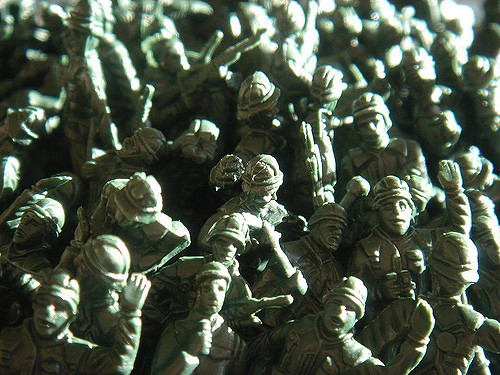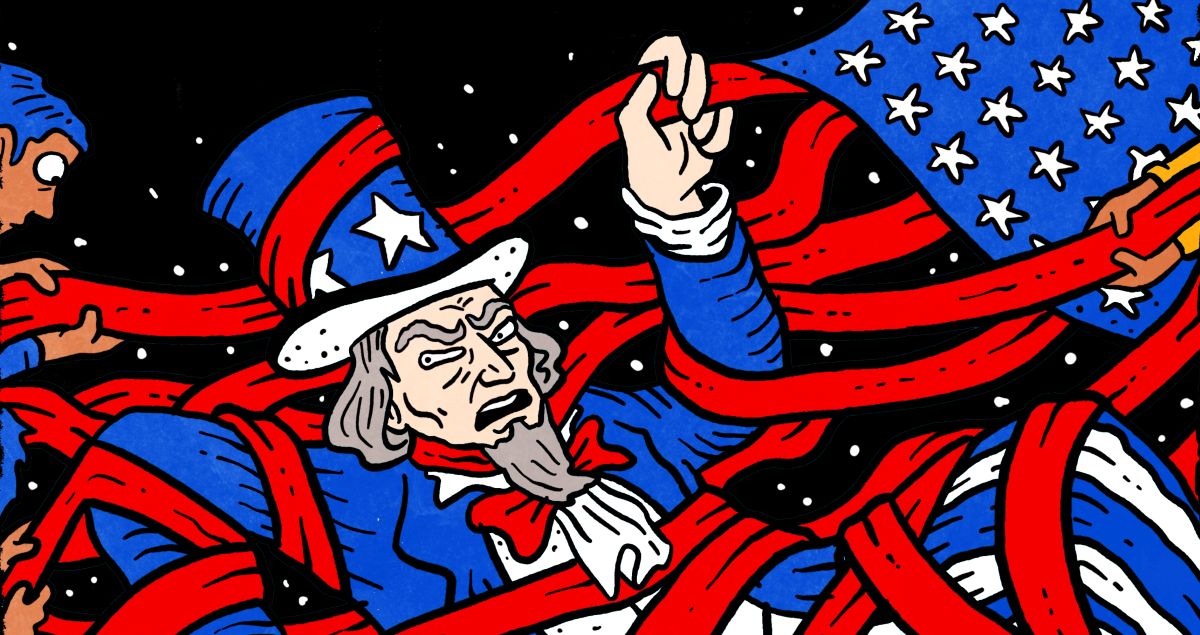‘Well I dunno, I think we just got to flatten ’em’ said the guy in the straw cowboy hat, talking to a local news crew. We were in Pueblo, southern Colorado, in the long queue for a Trump rally at the local convention centre. Straw Hat had been asked what he thought about foreign policy, and the Middle East. After a little prevarication he had come out with the ‘flatten’ line, to the general assent of people around him.
Pueblo is ground zero for this sort of stuff: by pure coincidence, it has produced four of the fourteen US soldiers to win the Congressional Medal of Honour for extreme bravery. The local angle on politics often has a khaki cast to it. The urge to flatten whole areas of the earth from an otherwise mild-mannered straw-hat dude wasn’t atypical.
But then, it’s not atypical of the view of many of Donald Trump’s followers, nor of Trump himself. In some quarters, Trump’s ‘America First’ rhetoric and policy is being portrayed as having some kinship with the right-wing isolationist strand of American politics, most recently channelled by Ron Paul. Paul argued for a simple and rapid end to the American empire: a substantial reduction in military spending, withdrawal from overseas bases, repudiation of any remaining notions of military humanitarianism. His stand built him a strong cross-political following, especially among the young, who were willing to ignore, or were simply unaware of, his decades-long association with anti-semites and white supremacists. Paul’s commitment to this was uncompromising, which is one reason why he never managed to advance beyond 10 per cent of the primary vote.
Trump’s pitch was ‘America First’, not ‘America Alone’. His lead argument has always been that America has to ‘start winning again’, and it is in that spirit that he attacks the conduct of war and foreign policy over the past fifteen years. He names Obama and Hillary Clinton in this; rarely, since the primaries, has he attacked George W Bush and the neocons. The Obama-Clinton military involvement in Libya allows Trump to pin all the blame for post September 11 military strategy on the Democrats; as well as Libya, they own Afghanistan and Iraq too. The last of these is dealt with via a convenient mythology – a ‘stoopid’ war had been brought under control in 2007-8, and then Obama threw victory by a hasty withdrawal. The whole process is erroneously constructed by Trump as ‘nation-building’, which it certainly isn’t, especially in Libya. By contrast, Trump proposes a strategy of ‘winning’ by which he means a build-up of the military so great that ‘no-one will mess with us’ – playing on the widespread perception on the Right that the US military has become smaller than that of other nations. If they do mess with the US, they’ll get hammered.
This is Trump’s pitch to his base – not an isolationism at all, but an imperial enforcement which disregards all the considerations that existing military operations include: regard to civilian casualties, protection of infrastructure, preservation of relations that will allow for post-conflict alliances. Trump’s fantasy, one that he sells to his base, is one of massive and simple retaliation, which will cow recalcitrant populations into obedience. It’s one reason why he has mused publicly about the use of nuclear weapons, a thought that fits nicely with the new generations of tactical, battlefield nukes. Trump has spoken of collective retaliation – kill the terrorists’ families – and put a positive spin on memories of US anti-Muslim atrocities in the Philippines occupation in the early twentieth century. These are code words for what many of his supporters are willingly to say more openly: flatten em, wipe em out, exterminate the brutes.
Trump’s war, then, is not against imperial projection of power, but rather the specific idea of ‘nation-building’, which he constructs as the shared neocon/Democrat mode of doing war, and thus linked to liberalism.
For Trump, nation-building is essentially a form of ‘politically correct’ warfare, in which one tries to sort the good from the bad. The premise of nation-building – that other people were virtuous, ‘yearned for freedom’ and should be liberated from their oppressors, and turned into loyal American allies – is detached from its position on the political right, and re-attached to liberalism/progressivism, which is where it was located from Theodore Roosevelt to the fall of LBJ in 1968.
In doing so, Trump is able to associate ‘nation-building’ and military failure in the Middle East with the social progressivism of the Democrats, essentially arguing that the good/bad foreigners distinction is equivalent to the alleged excessive concern for civil/human rights at home – of Black people killed by police, for example.
In a measure of the times, Trump’s strategy is in some ways complementary to the Hillary Democrats, who used the party’s convention this year to reclaim militarism for progressivism. The first night of the convention was filled with individual speakers from Black, Latino, LGBT, and disability communities advocating diversity – and each civilian representative of these groups was matched by an example from the military. On the final night of the convention, the stadium was festooned with flags, generals were on the speaking list, and the theme was one of strength abroad and diversity and equality at home, with the former projecting the latter out into the world. This is essentially a refashioned form of the liberal imperialism that saw the birth of the American Empire with the invasion of Spanish Cuba in the late nineteenth century.
No wonder so many foreign policy establishment figures have no problem backing Hillary: she and her team have constructed a new militarism that will be acceptable to many people who would once have protested the post September 11 neocon version, which emphasised the export of ‘free’ markets and the particular US system of government. New wars by Democrats will be fought in the name of social and cultural rights, and the notion that equality is expressed through diversity.
Trump’s militarism would be of a different type, but no less lethal, imperial or projective. For his followers he summons up the Reagan myth – that is, that Reagan’s election so scared Iran that it returned the hostages being held in the occupied US embassy on the day of his inauguration, and that when he did need to go to war – as in Grenada, that tiny Caribbean island – victory was swift and assured. George HW Bush’s success in the 1990–1 Gulf War is to a degree attributed to Reagan, since HW Bush has more or less disappeared from history. It also covers the inconvenient fact that Reagan never had a major war to contend with, and that his response to an early manifestation of Middle East suicide bombing – the lethal attack on Lebanon marine bases, which left hundreds of troops dead – was immediate and total withdrawal. For his followers, Trump reminds them of the myth, made whole in retrospect.
Such an approach feeds off the exterminatory imagination, and licenses it to be more bold. Trump has so far avoided explicit statements of ‘kill ’em all’, using coded references to past conflicts, ‘their families’ etc, but if we are to take him at his word, his foreign policy would be one which maintains bases across the world, while forcing host countries to pay more for their own defence; that extends the forward defence missile systems to Poland and the rest of Eastern Europe (his talk of leaving NATO is not a repudiation of such forward defence, but a questioning of multilateralism and fixed alliances, as opposed to ‘deals’ with specific countries); and one that imagines interventions in the form of massive attack.
For Trump, the way to deal with ISIS is to imitate and exceed Russia’s total disregard for civilian casualties, to adopt its practices of area bombing as opposed to targeted, boutique, liberal, effete drone strikes. Whether as President, surrounded by generals and cabinet figures, he would have the ability to impose his will and order up such a war is another question. Politically, the important thing is that it plays to his base, and their fantasies of exiting the bewildering years of military and foreign policy failure. What you hear on the ground from Trump supporters at rallies – a small and self-selecting sample true, but his core nonetheless – is overwhelmingly exterminatory in character, fused with the notion that the US has a right, duty and privilege to project violent power across the world. This is nothing like Ron Paul’s isolationist republicanism, his pitch to the US that it would recover its mythical virtuous character only by abandoning its corrupting empire.
Those who see that in Trump, or in his supporters, or who see some wellspring of resistance to empire, with a link to anti-politics and social and political reformulation, are fooling themselves. There is no mass appetite in the US, on the centre-left or on the right, to withdraw to the borders. Progressives are chastened by the rise of global dictatorships, which sends them back to the liberal imperialist idea that the US is a necessary global force for peace and advancement. The phrase I keep hearing at rallies is ‘Take it [the Arab Middle East] back to nature’, an echo of the Roman attitude to Carthage: destroy it all, and till the soil with salt.
The Right yearn to smite their enemies ‘before they get here’; were a President Trump, as an early move, to bomb Raqqa and its captive civilians into the earth, his authority on the Right would be assured – and it would reach into areas of the independent centre. He is inviting people to put on their straw cowboy hat and go to war.
Image: ‘Army’ / flickr




